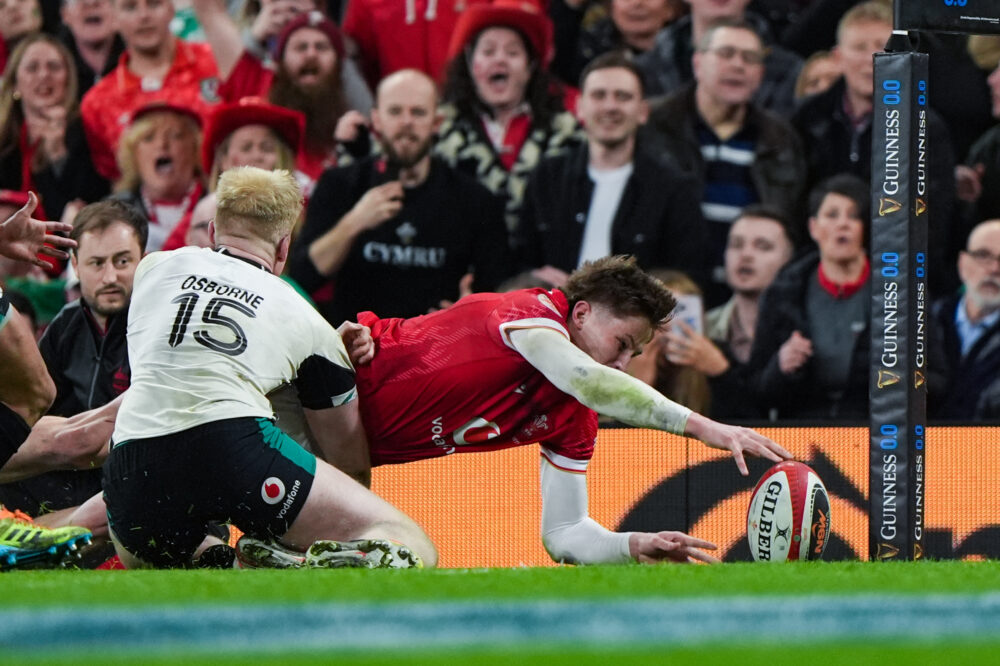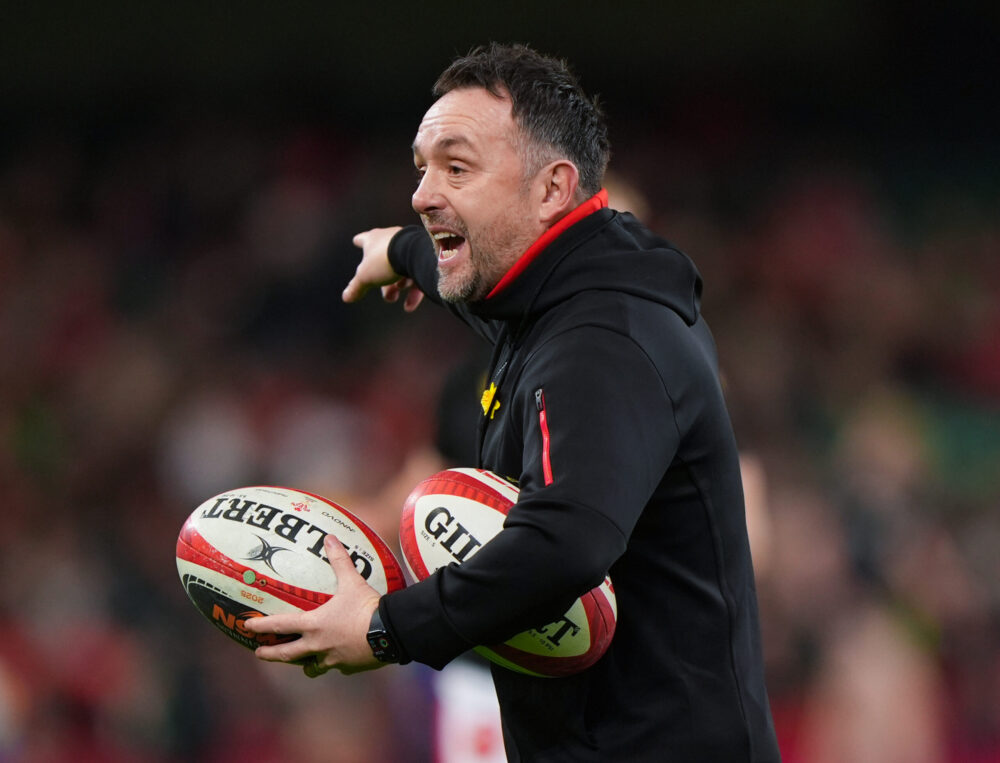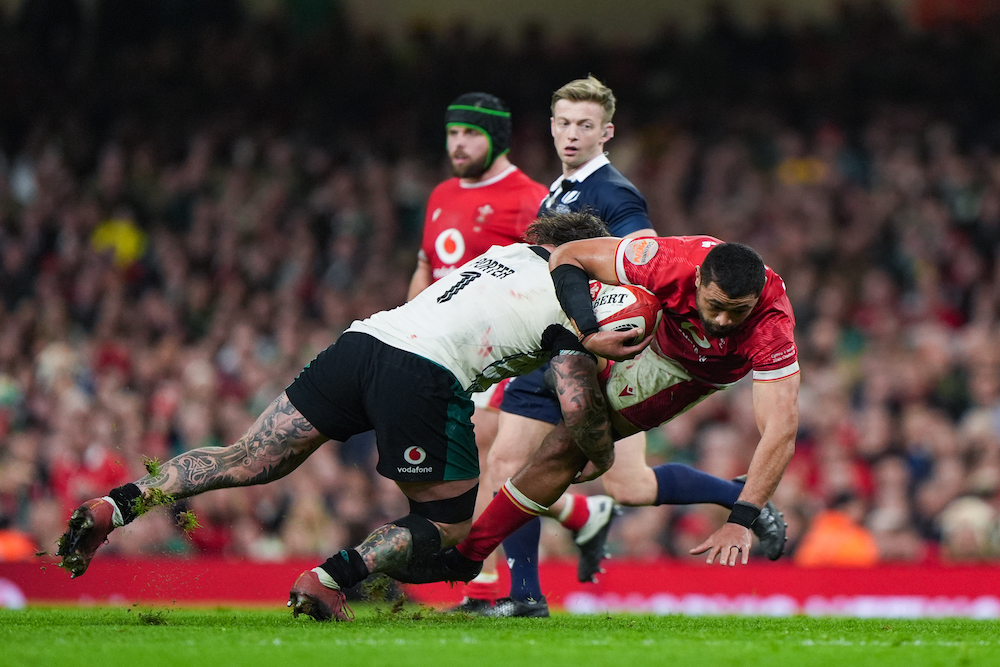Wales 18, Ireland 27: What a difference a weekend makes

Simon Thomas
It’s been a long barren spell for Welsh rugby, a time of woe, a period of pain, a wretched run of results.
But, finally, there are some signs of hope, some shoots of recovery emerging, just like the daffodils popping up as winter nears its end.
The tone was set on Friday night with Wales U20s beating their Irish counterparts 20-12 at Rodney Parade amid a monumental defensive display which saw them put in 228 tackles against 67 from their opponents.
You hoped that would serve as inspiration for the senior side in terms of the kind of heroism and commitment required against the No 2 team in the world if you are to avoid a thumping defeat.
But that was about as much as you really dared hope for – a gutsy display.
Yet what we got was so much more than that.
The effort and the endeavour was certainly there, but what we also got was an all-round performance of a quality which no-one had anticipated.
Dreamland
It led to Welsh fans finding themselves in dreamland, with the hosts leading 18-10 early in the second half following tries from Jac Morgan and Tom Rogers.
For a while, you really did start to wonder if the impossible could become possible.
Moving into the final quarter, it was still very much game on at 18-18, while one can’t help thinking what might have been had Ellis Mee been able to stretch out just an inch further seven minutes from time.
In the end, it wasn’t to be. Ireland did what they do, taking control when it really mattered at the business end of the game and getting the Triple Crown job done via the boot of Sam Prendergast.
But, when the final whistle blew, they knew they had been in a game.
For that, huge credit must go to interim Wales head coach Matt Sherratt who has taken over for the remainder of the Six Nations following the departure of Warren Gatland.
Transformation
The transformation he has brought about after just four full training sessions is nothing short of remarkable.
Wales were simply unrecognisable from the side which has looked so ramshackle and rudderless over the past year or so.
This was a totally different team and not just in terms of personnel amid eight changes from the defeat to Italy.
It was different in terms of structure, cohesion, intent and, perhaps above all, belief.
So how on earth did Sherratt manage it?
Well, this was his post-match reply to that question.
“It was about instilling confidence in the group,” said the Cardiff coach.
“We put a clear plan together for the players.Then it was about us removing the fear and letting them go on the field and express themselves within our structures.”

He added: “The Welsh public have been unbelievable. I have had so many messages, so much support, it’s been overwhelming really.
“So we knew the crowd would get behind the team, but I always flip it and say to the players it’s our job to engage the crowd – and they want to see two things. They want to see emotion and ambition and I thought we did that pretty well.”
U20s
Sherratt also made a point of referencing Friday night’s events in Newport.
“The U20s had a great win. There are some real shoots of hope. A good 20s usually equals a good senior team in two or three years time,” he said.
As for his own team, the plusses were plentiful.
To start with, the Welsh set-piece was as good as it has been for a long while.
They delivered a 95 per cent success rate on their own throw at the lineout, while there were also a couple of steals for good measure.
As for the scrum, that won four penalties in the first half with tighthead WillGriff John putting in a tremendous shift up against the much-vaunted Andrew Porter. It was some return to the international arena for the Sale prop after a gap of more than three years.
The solid first phase platform provided 57 per cent possession. But, of course, winning ball is one thing – being able to do something with it is another.
That’s where Wales have been found so badly wanting over the past year, lacking any kind of cutting edge.
But this, in turn, was where you saw the biggest transformation in their performance.
Their attack was just so much better than what we have become used to of late, so much sharper, with so much more variety, invention and creativity.
You had crisp passing, intelligent lines of running, adventurous offloading and fleet footwork. It was a revelation.
Clinical
They also showed a clinical edge, scoring 15 points during the 20 minutes either side of half time when Ireland were down to 14 men following the dismissal of Garry Ringrose, whose yellow for head-on-head contact with Ben Thomas was upgraded to a red on review.
Faced with very limited preparation time, the detail-focused Sherratt had opted to go with players he had worked with before in the key half-back and centre positions, players he knew could implement his game-plan.
It was a decision which was fully vindicated.
Gareth Anscombe brought experienced navigation at No 10, dovetailing well with Tomos Williams, with Ben Thomas looking so much more at home in his club role of 12, while Max Llewellyn was a real focal point at outside centre, straightening the line and crossing the gain-line.
Then, when another recalled former Sherratt charge – Jarrod Evans – entered the fray, he added a further level of playmaking.
You also had real threat out wide with Mee having an outstanding Test debut on the wing, the elusive Blair Murray looking the part at full-back and Rogers producing a wonderfully acrobatic finish.
It was fascinating listening to former Wales and Lions skipper Sam Warburton give his take on the attacking re-invention while speaking on the BBC.
He pointed to the use of a diamond formation, with four players – three forwards and a back – appearing in close formation, the rugby version of the Red Arrows, if you like. That provided options for the player in possession and left the opposition uncertain of just where the ball was going and which man to watch out for.
That, in turn, sucked in defenders and created the opportunity for a second wave of backs on the outside to deliver the line-breaks, of which there were seven.
“Wales had a lot more shape in attack,” said Warburton.
“There was a clarity in what Matt Sheratt wanted from them. They knew what they were doing.”
Appreciated
Warburton also rightly pointed to the fact that the much improved display was hugely appreciated by the home fans.
“The atmosphere was the best it has been for the last two years,” he said.
“Every Welsh fan will have left the stadium feeling very proud of the team. It was chalk and cheese from what we saw in the first two rounds.”
Another former skipper, Alun Wyn Jones, added: “Against the backdrop of everything that has gone on, it’s credit to the staff and players to put that performance on.”
As for the view from the victorious Irish camp, scrum-half Jamison Gibson Park said: “We have to give a lot of credit to Wales. It was very tough out there. They are a proud nation and they showed that.”
Gibson-Park was named Player of the Match, capping his display with the pinpoint cross kick which led to the try for Jamie Osborne that drew the sides level midway through the second-half.
But while he was excellent, there were a number of players in the Welsh side who would also have been strong contenders.

Taulupe Faletau displayed his ageless class at No 8, making more carries (15) than anyone else on the pitch and showing he’s still as light on his feet as ever, while Mee wasn’t too far behind on 13, with the Scarlets winger also producing two line breaks and winning a turnover as he made one of the most impressive Test debuts for years.
Defensively, Tommy Reffell led the Welsh way with 17 tackles, while fellow flanker Jac Morgan put in 13 to go with his 12 carries and mighty leg drive that earned him his try just before the break.
But, in truth, credit is due right across the board. This was just so, so much better.
BBC match commentator Andrew Cotter summed it up succinctly on the final whistle.
“Ireland win the game, they win the Triple Crown, but Wales win the hearts and minds of their supporters who have suffered so much.”
It was a weekend that had the sense of a new beginning.
Support our Nation today
For the price of a cup of coffee a month you can help us create an independent, not-for-profit, national news service for the people of Wales, by the people of Wales.






A white wash beckons.
I believe you will be proved right, with your ‘WHITE wash’ being the correct description considering the CEO, Chairman and Coach are all English.
Very surreal and sinister times in politics, which has now found its way into Cymru rugby.
‘What a difference a weekend makes’, er’ no, I believe we should look to the end of the current coaches time and consider ‘what a difference a month makes’ as we head to probable back to back Wooden Spoon whitewash, regardless of coach changes. Agent Abigail came in with a grovelling and toe curling article from one of our many incompetent click baiting journalists. It started with the statement to the effect of ‘she doesn’t know anything about rugby, but why should that be a problem?’ We have some quality former player pundits now (Warby, Jamie, etc) who played the… Read more »